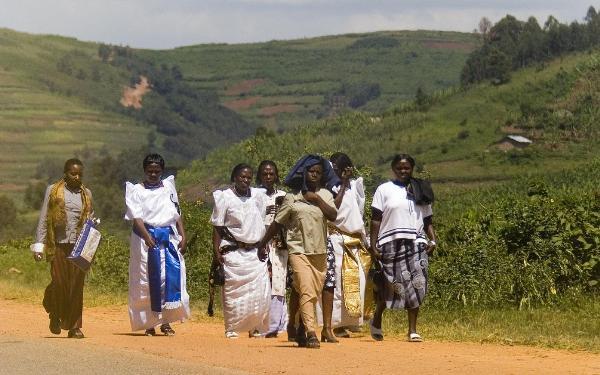Having recently returned from East Africa where he visited projects run by Cafod and its partners, Bishop John Arnold reflects on the challenges of working with communities that have been devastated by war and poverty, and on the signs of hope he encountered.
It is just one week since I returned from 12 days in Uganda and Kenya. Representing the Catholic Bishops’ Conference of England and Wales, I was accompanying Chris Bain, Director of Cafod, to see the extent of the work being done by Cafod and its partners to help the people of these countries. Even at the distance of one week, I find it quite hard to focus on the diverse impressions and feelings of those few days. I should say that I travelled to the same two countries in 1969, as a schoolboy, but the countries that I saw on this trip were entirely different; almost unrecognizable.
If I were to select two of the most positive impressions of Uganda I would have to begin with the exuberance and the kindness of the people that we met, both in the capital Kampala and in some of the more remote regions of the country. We could not fault the hospitality and the friendliness of the people that we visited and their generosity in offering us everything that they had. The second thing that I found so remarkable was the lush fertility of the land and its beauty. The rich red soil of Uganda can produce abundant crops in profusion.
If there is one thing that I would wish to banish from Uganda it would be the extreme poverty, born of the violence of a largely unpublicised 22-year-old war and the epidemic of AIDS, both of which have crippled economic progress for the vast majority of the population.
We travelled extensively in Uganda, returning several times to the capital city of Kampala from districts to the east and west and from the war weary provinces of the North. Our first visits were concerned with the ongoing work with those living with HIV and AIDS. To a large extent the stigma of HIV and AIDS has given way to a much clearer understanding of the nature of the infection, meaning that positive steps can now be taken to ensure that those living with HIV can look forward to a much longer life, and greater well-being. We visited clinics and outstations where people were learning to adapt to the new medicines. We heard very moving testimonies of those who had relied on the charity of the clinics so that they could return from the wasting effects of HIV, and we saw the continuous efforts to persuade the guardians of young children to enusre that the children are tested for the virus before their lives were so badly affected. There is a generation of orphans, one diocese alone estimating that there were 150,000 within its borders. We saw music and drama performed by people living with HIV which were designed to be instruments of education for towns and villages where the work of raising awareness about HIV and AIDS still goes on. So many of the volunteers were themselves HIV positive and I was very impressed to discover that Cafod network with so many of the local people who understand the problems at first hand.
Our second concern was to visit "livelihood projects", in their various forms. We visited a young widow with four children who had been helped to learn about market gardening and tending domestic animals, to the extent that from her tiny and beautifully tidy plot of land she was not only able to support her family but had surplus crops and dairy products to trade with neighbours. Further north, near the border with Sudan, we met with groups (each group comprising about 20 families) who were among the pioneers returning to their own land after 15 years in refugee camps. The length of time that the families have had to spend in such camps has meant that the understanding of farming and living on the land has not been passed down to a whole new generation, and the amazing fertility and energy of the soil has meant that, in many cases, identifying homesteads and farms has become a practical impossibility and now the source of much litigation. But many groups have begun to move from the main refugee camps to satellite camps much nearer the land that they had previously farmed and an increasing, but still small, number have moved back onto the land itself. Cafod's partners have done much to teach these returning refugees about how to farm the land most effectively, in many cases producing two crops in one year. One group with whom we spoke nervously produced some bank savings books, showing us small deposits of money that they been able to make even after the first year of their return: something they would not have dreamt of even a few months ago.
In the North the sense of the weariness of war was still quite evident. Apart from the numerous refugee camps, it was clear that the infrastructure of roads, drainage and water supplies had been overburdened. But in these days the people speak hopefully and longingly for the peace accord which, although ready and waiting, remains unsigned. In Gulu we stayed in the junior seminary from which the Lord's Resistance Army had abducted 41 of the schoolboys just three years ago to become their boy soldiers. To this date only 30 have returned. And even when peace is secured, the return of the combatants will bring its own difficulties when family members – although abducted – will return as former enemies.
It was from the evident hopeful joy that we encountered that moments of possibility seemed to emerge, even in the most desperate situations and circumstances. There was just one place in Uganda that we saw that seemed to have no trace of hope. We had begun our day with Mass in the only enclosed Carmelite convent in Uganda, in Mityana. This had been a wonderful occasion. There were all the hallmarks of Carmelite life in the cloistered buildings and sparse beauty of the place, combined with the African drums and music that accompanied the liturgy. The 11 sisters were joined at Mass by a least a hundred smiling local families dressed in their very best for their prayer. It was only a 10 minute drive that took us from the serenity of that place to the squalor of the local prison. The 130 prisoners, most of whom were still on remand, were seated on the ground in an open yard. In this mixed prison, we saw the dormitory space for the men – there is not even room for everyone to lie down to sleep. The sleeping space for the women was an airless and windowless cupboard. We were able to deliver the generous gifts of one of the farming communities that we had visited (chickens, sugarcane, sweet potatoes, fruit) to supplement what was otherwise a daily portion of a porridge-like gruel. The hopelessness of this place seemed to lie in the fact that no one was even questioning the conditions in which these men and women were expected to live, or their dignity while awaiting trial.
One high point of our visit was the unscheduled opportunity to participate in the ordination of a local bishop. The sense of celebration was palpable. Some 15,000 people gathered under canvas awnings to greet their new father in God. From beginning to end, some six hours, the atmosphere was one of celebration and thanksgiving. Symbolic actions were everywhere, not least in the procession that brought the lectionary to the altar wrapped in banana leaves, the same way that the people wrap their gifts to one another. The Word of God was clearly seen as his precious gift to his people.
Travelling on behalf of Cafod inevitably meant that we saw many people in need. It was very striking to find so many people who felt a sense of urgency about helping themselves and learning ways to improve their situation. The danger of long-term existence in refugee camps can so often mean that people become "institutionalised", receiving handouts for their basic needs with the sense that they are being kept safe from the enemy. But we found an energy and a determination among the Ugandan people to make the changes improve their lives.
Our trip came to an end with a short sojourn in Kenya. Cafod's East African office is in Nairobi and that gave us an opportunity to hear, at first hand, of the diversity of projects through which they are assisting their partners. It also gave us the opportunity to visit Kibera, which is said to be the biggest slum in Africa. Throughout our brief stay in Kenya we continually heard of the impact of the post-election violence on every aspect of life in Kenya, particularly pronounced in Kibera where projects are underway to build a sense of reconciliation that will surmount the tribal divides.
As I write these words I am very conscious that, just eight hours away, there are problems and challenges which belong to a world which is so remote from all that is familiar to me. But I am also proudly aware that with our new global thinking these different worlds are, as St Paul would have us understand, parts of one body. And it is not just a matter of us giving. During even this short trip I received much; not just from the friendliness and generosity, but I learned too of resilience and hope in the face of adversity and of people determined to change in order to prosper.
The Right Rev John Arnold is Auxiliary Bishop of Westminster and Titular Bishop of Lindisfarne.






